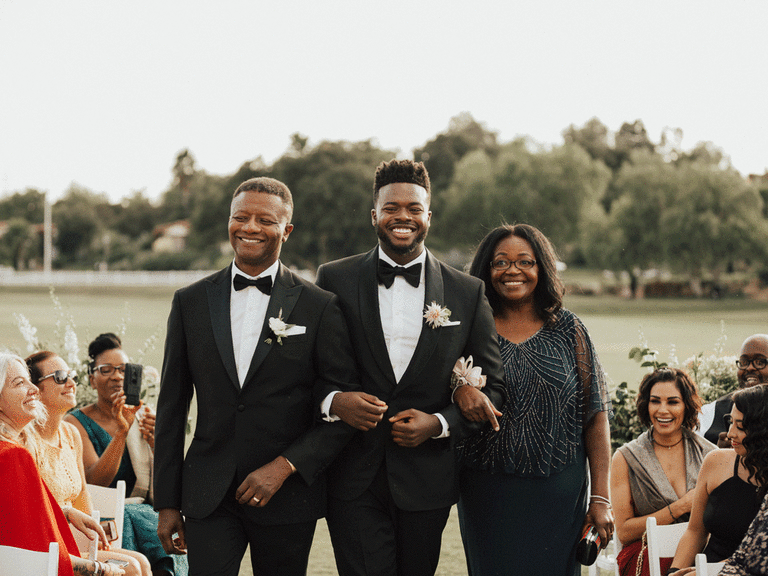Wait a Second, What Does the Groom’s Family Pay For?
So, you just got engaged (congrats!) and have a few questions during your wedding planning process. One of the most important concerns you may have while planning is the cost and overall wedding budget—more specifically, what does the groom's family pay for? If wedding finances are at the top of your mind, you aren't alone. According to The Knot Real Weddings Study, which surveyed nearly 12,000 couples, 64% of couples said cost or budget was the most important to them while planning their wedding. For couples who identify as a bride and a groom, there are traditional guidelines to help families decide who's in charge of each wedding-related expense to determine what the groom's and bride's parents pay for. However, not all couples identify that way or want to follow those wedding budget guidelines. Splitting wedding costs equally between the couple and their families is becoming more common across the board: Our wedding study found that couples pay approximately 49% of their wedding costs, with their families covering the rest at 51%.
But even though those financial arrangements worked for the real couples we surveyed doesn't mean you and your family have to follow suit. If you take away anything from this article, remember three things. First, don't think, "What should the groom's parents pay for?" Instead, use the traditional monetary duties below as a useful guide during your conversation with your loved ones. Second, hire a wedding planner to help you stay within budget—you can find and book one through The Knot Vendor Marketplace.
Pro tip: To learn more about how much items cost in your region, use our free budget tool to see what real couples typically pay.
In this article:
- What Does the Groom's Family Traditionally Pay For?
- Tips for Asking the Groom's Parents for Wedding Money
- What to Do If Groom's Parents Can't Help Pay for the Wedding
What Does the Groom's Family Traditionally Pay For?

There's no right way to decide financial responsibility, so discuss what works best for you, your partner and each family. You may want to know what the groom's parents pay for whether you're following tradition or looking for suggestions. Here, we outline the most common groom's family wedding expenses.
Groom's Partner's Engagement and Wedding Ring
What do the groom's parents pay for before the wedding? Well, it's typical for the groom to have already bought their partner an engagement ring, but it's not uncommon to see the groom's parents cover the cost of the engagement ring and the wedding ring. Some parents of the groom pay for the ring(s) to help keep the financial burden off the couple.
Wedding Officiant
According to our company data, couples put an average of $240 toward hiring a wedding officiant, which is one of the traditional groom's family responsibilities. If you hire a religious wedding officiant, they usually don't require a fee. Instead, a religious officiant may ask for a donation or their wedding night stay to be covered. The amount the groom's parents donate is up to them.
Engagement Party (Optional)
Not everyone has an engagement party, but when to-be-weds do, the groom's family might like to host a celebration in honor of the newly engaged couple. If the groom's family wants to host, it would be their responsibility to cover the party expenses.
Groom's Attire and Accessories
If the groom's family is willing to contribute to the wedding, the groom's outfit and accessories are often another expense they pay for. These items could include a tux, shoes, tie, socks and more. Keep in mind: Groomsmen are expected to cover the cost of their attire.
Groomsmen Gifts
To show their wedding party members appreciation many couples give them special gifts. Helping buy the groomsmen gifts is another way the groom's parents can contribute to the wedding.
Flower Accessories
Okay, we've covered the groomsmen gifts, but who pays for wedding flowers? The groom's family pays for some of the floral expenses associated with the wedding party. That includes the wedding bouquet, the groom's and groomsmens' boutonnieres and the corsages for honored guests.
Heather Balliet, wedding planning expert and Owner of Amorology, offers more insight into this paying custom. "While it's tradition for the groom's family to pay for the personal flowers i.e. (bride's bouquet, boutonnieres, corsages, etc.) it can sometimes get tricky portioning out which family pays for what part of the floral invoice. We suggest picking another vendor on the groom's side to help pay for instead, like the wedding band if they would like to make a larger contribution or videography."
Reception Entertainment
What else do the parents of the groom pay for? Oftentimes, wedding entertainment falls under the groom's parents' responsibility. This could mean a live band, DJ and any other entertainment like a photo booth.
Reception Alcohol
Many to-be-weds wonder, "Does the groom's family pay for alcohol?" This isn't a required, but sometimes the groom's family will offer to chip in for the wedding reception alcohol. Based on data from The Knot Real Wedding Study, couples spent an average of $2,400 on alcohol for their wedding, so any financial help the groom's family can provide will greatly decrease the reception costs.
Marriage License
The marriage license fee varies from state to state. Although it's not considered a huge expense, some families offer to pay for the marriage license. It's a small gesture that goes a long way.
Rehearsal Dinner/Welcome Party
What is the groom's family supposed to pay for? Well, if you're looking to follow tradition, that side of the family is in charge of hosting and paying for the rehearsal dinner and/or the wedding welcome party. A few of the party expenses are drinks, food and venue rental fees. Since the groom's family is paying for these events, they control how it's organized.
Honeymoon
Traditionally, at weddings where there's a bride and a groom, the groom's family pays for the entire cost of the honeymoon since the bride's family pays for the wedding. Honeymoon costs include flights, hotels and fun vacation activities. It's important to note that modern couples are saving for their honeymoon together or creating honeymoon funds for their guests to send money to as a wedding gift.
Tips for Asking the Groom's Parents for Wedding Money
Determining the groom's parents' wedding responsibilities and having money conversations can be tough. Balliet explains below how to directly and politely go about this the right way.
1. Make time for a sit-down meeting.
"Schedule or set aside a time to take your soon-to-be in-laws out to dinner or have a family meeting to chat over your wedding plans as a whole and discuss the overall vision," Balliet suggests. We think you should speak with each other in person or over video chat if possible because of the seriousness of the conversation.
2. Go into the conversation with an open mind.
Talking about wedding expenses with your family can be intimidating or even awkward, but you have to be open and honest when asking parents or in-laws to pitch in financially. Come to the conversation prepared with a (realistic) wishlist of ways they could give, and be open to discussion. By being straightforward, there's less room for miscommunication.
Any money your family can put towards the wedding is very beneficial, so don't go into the conversation expecting a certain amount. "When talking things over with your groom's parents, you can ask if they 'Would like to contribute to the wedding in any way' or 'Are you able to contribute to the wedding?' Be gracious about what they offer to give since any contribution is a gift," Balliet says.
3. Involve the groom's parents in the planning process.
One wedding etiquette rule that hasn't changed is that whoever provides money for the wedding can share their opinion about the specific service they're contributing to. So, if your parents are helping pay for your wedding, be considerate and listen to their suggestions. If everyone is willing to compromise, you and your family can plan a beautiful and memorable wedding.
4. Have a second check-in.
"Halfway through the planning process, it's a good idea to regroup and chat about where you are financially and with the planning to see if there's more help needed," Balliet shares. Communicating as much as possible is always the best plan, so no one is confused and everyone is on the same page.
What to Do If Groom's Parents Can't Help Pay for the Wedding
"Be understanding. If the groom's family can't help financially, there are still other ways they can show their love and appreciation for the couple and their big day. [For example,] delivering items to the venue, creating something handmade that can be worn on the wedding day by the couple, baking desserts, etc. Also, there might be other people in your life who you're close to who might be open to contributing to the wedding," Balliet says. Families can also chip in by mailing invitations, getting vendor quotes or assembling wedding favors.




























